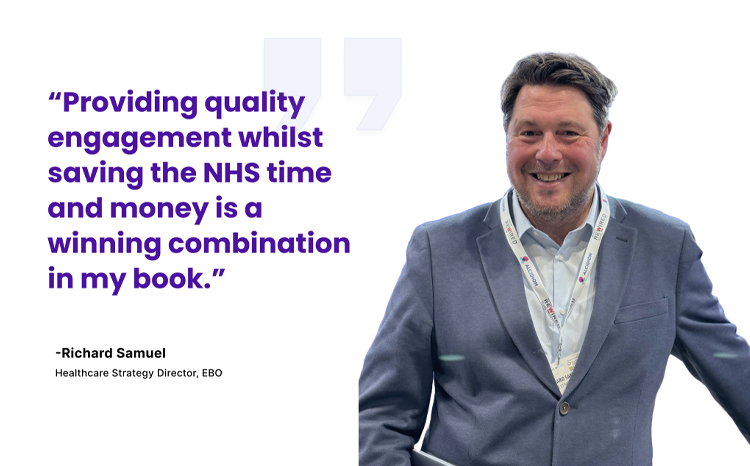NHS England’s federated data platform: One year on
- 2 December 2024

One year after the launch of NHS England’s federated data platform (FDP) many of the initial concerns about its adoption have proven unfounded, argues Matthew Taylor, chief executive of NHS Confederation.
A year is a long time in health policy. Since the election in July we have seen several significant announcements, the Darzi report exposing the deep challenges facing the NHS and the launch of a major public engagement leading up to a 10 year strategy scheduled to be unveiled next May.
It’s also been a year since the launch of NHS England’s FDP, a digital transformation project for the health service which seeks to join up operational data across NHS organisations to support staff and ensure more joined-up care.
One of the three shifts outlined by Wes Streeting, secretary of state, as being at the heart of his approach to reform is ‘from analogue to digital’. The FDP is often cited as being central to this shift.
Perspectives on the FDP have changed since its launch. Then, much of the debate centred on whether patients would trust the platform, and whether organisations would decide against using it in favour of their own systems.
These concerns have proven to be largely unfounded. NHS England has celebrated adoption rates very likely to exceed expectations for the first year of delivery and are multiple trusts coming forward with positive examples of the FDP helping productivity and patient outcomes. These examples stretch from Chelsea and Westminster in London to North Tees and Hartlepool up in County Durham.
Last year, as FDP supplier Palantir was being announced, I wrote about the importance of setting realistic expectations. The NHS has long struggled with fragmented data systems, leading to a range of failed integration attempts. These past failures tell us how important trust and careful implementation needs to be: you can’t promise the moon if people are still struggling to get off the ground.
A successful FDP should mean that trusts and integrated care systems (ICSs) alike can use the data they already have to improve services, that their organisational priorities can be achieved through this transformation, and crucially – that they feel heard by programme developers in sharing their concerns or issues.
We are only one year into a seven-year contract, and a considerable number of acute trusts and ICSs have expressed their intention to join the FDP, with many already having completed their transition. But there is plenty to do to build on these early successes.
Despite the high adoption rates, many have said they struggle to use the full functionality of the FDP, despite working through standardisation issues with data quality and the low usability of some electronic patient records.
Other users are also stuck in the legal stages of organising data sharing and implementation so that data privacy in FDP and the data ICS may already be collating are aligned, which causes delays down the line. Addressing the foundations and being pragmatic about the rate and pace of adoption can help the FDP fit for the NHS as it is right now, not just for the future.
Trusts and ICS members have told us they are feeling positive about the FDP, and many are excited for the potential it brings. However, there is a sentiment among many others that it’s not the platform they thought they were getting, as some are thinking about opting for an advanced version of FDP by procuring other systems and platforms to meet more of their needs– but few can actually afford this. Many are keen for more clarity from NHSE and a stronger culture of improvement as they move forward with the platform.
Despite the rate of take up (or perhaps to an extent reflecting it), there is inevitable concern around eventual mandating of the FDP in the future. Whilst NHSE assure leaders that this is not planned, many remain concerned that organisations with similar (or more advanced) data solutions will need to sacrifice their ability to be innovators as they are pressed to meet central FDP targets and deadlines.
Many ICBs are signing up to help in the efforts to join up care, but integrated care board specific products such as population health management tools, while in high demand are still yet to be fully developed by NHSE. Let’s not forget the community and mental health trusts who could use the FDP but are yet to be onboarded.
The importance of data within the NHS, and the need to make effective use of it whilst keeping it secure is a hot topic in the NHS not just among digital managers; it is, for example, often seen as core to the development of integrated neighbourhood services. The FDP requires all parts of an organisation to work together and understand the use of digital and data to enable greater productivity and improved patient outcomes.
There is no sign of the FDP stopping, and I look forward to seeing more examples of how the platform is delivering better care for patients. But as I heard from one NHS leader, more resource is needed to “do this once well, rather than try it and see.”
Alongside developing this platform, we need to support a culture of improvement from the ground up to ensure that the foundations are laid for innovation and transformation for the long-term.





2 Comments
Could references be added to expand on this sentence: ” These examples stretch from Chelsea and Westminster in London to North Tees and Hartlepool up in County Durham”? There are indeed many NHS people interested in how this is working and finding work or people who have examples can be useful.
Hi Zoë, thanks for your comment. There are a couple of examples which may be helpful in our previous stories:
https://www.digitalhealth.net/2024/09/more-than-half-of-acute-trusts-signed-up-to-the-nhs-fdp/
https://www.digitalhealth.net/2024/11/trusts-using-fdp-treat-114-more-patients-a-month-on-average/
https://www.digitalhealth.net/2024/05/northamptonshire-hospitals-are-first-to-transition-to-local-instance-of-fdp/
Comments are closed.